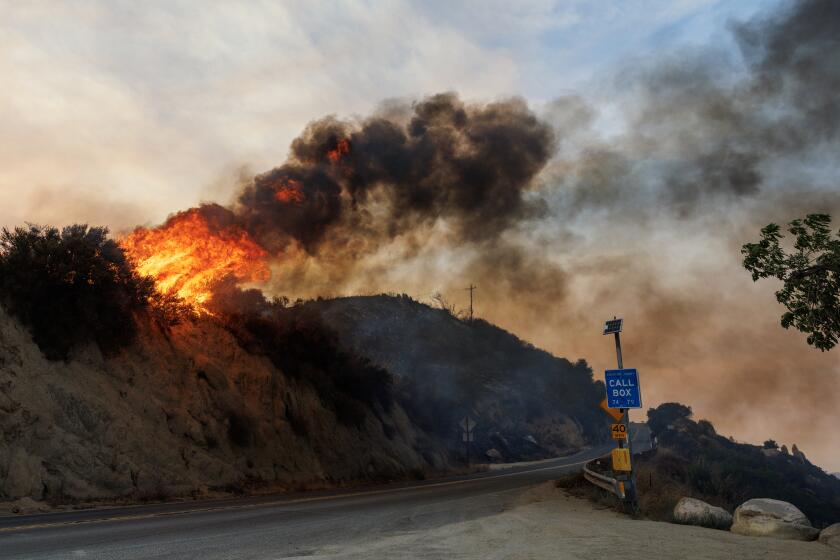L.A. agency to urge mandatory quake retrofits for older apartments
After months of studies, Los Angeles’ building department will recommend requiring owners to retrofit thousands of wood apartment buildings vulnerable to collapse during a major earthquake.
The retrofitting would be mandated for apartments with weak first floors, such as those built on top of carports and supported by slender columns.
These types of buildings have collapsed during both the 1989 Loma Prieta and 1994 Northridge earthquakes. Sixteen people died when the Northridge Meadows apartment complex pancaked.
Raymond Chan, who heads the Department of Building and Safety, told The Times on Wednesday the agency decided to seek mandatory retrofitting after spending months working on an inventory of so-called “soft story” apartments in the city.
The survey, ordered by the City Council, is expected to be completed by January. Officials estimate there are 5,800 buildings that need strengthening and about 11,600 more that require further study.
The proposal needs the backing of the City Council and Mayor Eric Garcetti. Garcetti in his state of the city speech expressed support for some form of mandatory retrofitting, and a spokesman said Wednesday the mayor would address the issue in coming months.
If approved, the retrofitting could be completed in four to five years, Chan said.
Los Angeles would follow San Francisco, Santa Monica and other, smaller cities in ordering property owners to strengthen apartment buildings, a step that can cost $60,000 to more than $130,000.
Some L.A. property owners said they now expect the city to pass a mandatory retrofitting ordinance but hope that it comes with some type of financial aid.
“We will continue to work with all city officials to make sure that our apartment owners and landlords can meet the demands of the mandate financially. It’s really going to hinge on that,” said Beverly Kenworthy, executive director of the Los Angeles division of the California Apartment Assn.
“I think we can make that happen, within an appropriate timeframe, and with a clear and precise direction,” she said. “Our ultimate goal is the safety of our tenants.”
L.A. City Councilman Mitch Englander said the city was getting more serious about better protecting buildings during earthquakes. But he stressed that he could support only a mandatory retrofitting plan that includes financing options for property owners, such as tax breaks. Other ideas include a bond measure and low-interest loans.
“We’ve come a long way. It’s night and day,” he said. “It’s critically important that we get it done in some fashion.”
Finding all the soft-story buildings hasn’t been easy. No city data existed to easily identify which structures are wood-framed and soft-story, building officials said. The survey focuses on structures built before 1978 with at least two stories and at least five units.
Of the city’s roughly 1.1million structures, staffers were able to winnow the number down to 29,226 apartment buildings constructed before 1978. Officials have completed a preliminary assessment using Google Earth and mapping programs to narrow down which apartment buildings need further on-site inspection, Chan said.
The project was expected to take about 18 months, but inspectors have already covered a lot of ground, Chan said. His department recently finished surveying Council District 2, in the North Hollywood and Studio City area, and identified about 2,000 buildings that will be included on the list.
Officials would not say what retrofitting policies they’re considering for the city’s more than 1,000 older concrete buildings, which Garcetti has said are also a seismic safety issue the city needs to address. These concrete buildings are considered the greatest risk to loss of life in a huge quake.
Lucy Jones, a seismologist with the U.S. Geological Survey and Garcetti’s earthquake advisor, said mandatory retrofitting ordinances tend to be more effective than voluntary ones. She is consulting with the mayor’s office on retrofitting and other seismic safety recommendations. That report is being developed, she said.
“Retrofitting of old, bad buildings has got to be a key issue,” Jones said during a presentation to City Council members Wednesday, in which she also talked about the vulnerabilities of aging water pipes and utility lines.
Jones’ presentation came a day before the Great ShakeOut, an annual preparedness drill to remind millions of people across the country how to better prepare for an earthquake.
San Francisco approved its soft-story apartment ordinance last year after more than a decade of discussion.
The city estimates there are 4,000 vulnerable buildings. This fall, officials said they will slap earthquake warning signs on apartments whose owners have not complied with the law. Owners whose buildings are found to have problems must retrofit.
More to Read
Sign up for Essential California
The most important California stories and recommendations in your inbox every morning.
You may occasionally receive promotional content from the Los Angeles Times.











